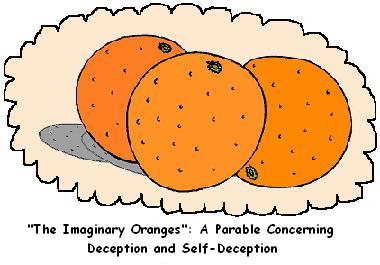

 In the writings of a 9th Century Arab we find this tale which exemplifies the traditional Arab attitude toward deceiving others and even toward deceiving themselves:
In the writings of a 9th Century Arab we find this tale which exemplifies the traditional Arab attitude toward deceiving others and even toward deceiving themselves:
 Ahmed, the wisest man in the village, was trying to take a nap in the shade, but the noise of the children playing nearby kept waking him up. "What can I tell them to get them to go away?" wondered Ahmed. Being a wise man, he quickly thought of a convincing but untrue story:
Ahmed, the wisest man in the village, was trying to take a nap in the shade, but the noise of the children playing nearby kept waking him up. "What can I tell them to get them to go away?" wondered Ahmed. Being a wise man, he quickly thought of a convincing but untrue story:
 "Children," he cried out, "it is written and it is said that the people of the next village give away sweet tender oranges to anyone who visits them."
"Children," he cried out, "it is written and it is said that the people of the next village give away sweet tender oranges to anyone who visits them."
 And instantly all the children started off on the three-mile journey to the next village. Ahmed smiled to himself as he listened to the laughing children disappearing into the distance.
And instantly all the children started off on the three-mile journey to the next village. Ahmed smiled to himself as he listened to the laughing children disappearing into the distance.
 But as he considered how happy the children were, and how sweet and tempting oranges are, and how lucky the children were to be on their way to village to enjoy sweet oranges, and how fortunate he could be if he went with the children to get some free oranges. . .well, in only a moment or two he reached a decision:
But as he considered how happy the children were, and how sweet and tempting oranges are, and how lucky the children were to be on their way to village to enjoy sweet oranges, and how fortunate he could be if he went with the children to get some free oranges. . .well, in only a moment or two he reached a decision:
 "Why should only the children get oranges? I am going to run after them and accompany them to the village so I will get some oranges too."
"Why should only the children get oranges? I am going to run after them and accompany them to the village so I will get some oranges too."
 The point of the story is fairly clear. Arabs traditionally feel it is O.K. to use deception to gain their ends (which is a polite way of saying that lying is acceptable in traditional Arab culture), but they also manage to deceive themselves in the process.
The point of the story is fairly clear. Arabs traditionally feel it is O.K. to use deception to gain their ends (which is a polite way of saying that lying is acceptable in traditional Arab culture), but they also manage to deceive themselves in the process.
 Thus many of the stories of Israeli atrocities told by the Palestinians are not really true but they have come to be believed by the Palestinians in the same way that Ahmed came to believe in the oranges he invented to get rid of some noisy children.
Thus many of the stories of Israeli atrocities told by the Palestinians are not really true but they have come to be believed by the Palestinians in the same way that Ahmed came to believe in the oranges he invented to get rid of some noisy children.
Click on your computer's "back" button to return to main page or click on the button below.
